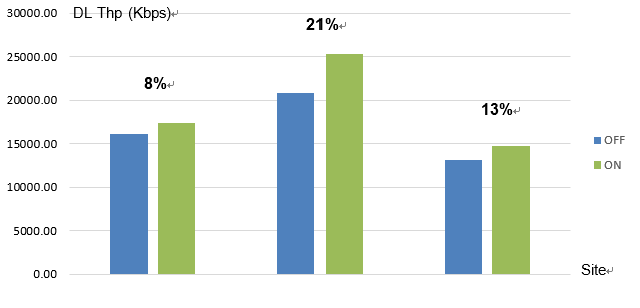Huawei Completes the World's First Commercial Verification of SuperBANDHuawei Completes the World's First Commercial Verification of SuperBAND
March 7, 2019
[Barcelona, Spain, February 24, 2019] Huawei has completed the first commercial verification of SuperBAND (phase 1) at its field in Asia Pacific. The result showed that the average download rate increased by more than 10% after this solution was enabled.

The commercial verification on phase-1 vertical SuperBAND involved four LTE FDD carriers and four LTE TDD carriers. Before the verification, the network in question faced the problems that plague many multi-band networks across the world: Inter-frequency measurement costs high overhead due to multiple frequency bands; the differences in load, interference, antenna configuration, and other aspects of carriers result in inconsistent effects of different carrier combinations, decreasing user experienced data rates. In this verification, the SuperBAND solution enables complex multi-band measurements to be completed within milliseconds, rather than over the course of several seconds. Moreover, it selects the optimal carrier combinations for carrier aggregation based on the spectral efficiency of UEs, significantly improving user experience.
The SuperBAND solution was launched by Huawei at the Global Mobile Broadband Forum in November 2018. As 2G/3G spectrums are increasingly refarmed for LTE, both the total bandwidth of LTE bands and the number of carriers increase. How to maximize the spectral efficiency of multi-band networks poses a serious technological challenge to operators and Huawei’s SuperBAND is an innovative answer.
SuperBAND consists of horizontal and vertical branches. Horizontal SuperBAND uses super filter technology to fully utilize guard bands, which were previously system overhead, between intra-band spectrum segments. As a result, more available spectrum resources are spared for operators. This solution is applicable for the more than 1/4 of the operators in the world that use two or more spectrum segments in a single frequency band. Meanwhile, Vertical SuperBAND includes two phases. In phase 1, AI-driven virtual grid models for network information prediction are used to quickly select optimal carrier combinations for UEs. Phase 2 will enable ultra-low-latency data scheduling, improving the efficiency of multi-band networks and delivering a 5G-like large-bandwidth user experience.
Mr. Cao Ming, President of Huawei’s LTE Product Line, says that LTE will continue to exist for a long period of time and will continue to evolve in the 5G era. He also states that SuperBAND is the key to this evolution, together with other related technologies such as massive MIMO and low latency technologies. As a breakthrough in multi-carrier management and spectrum utilization, SuperBAND frees LTE networks from traditional spectrum constraints and offers a much-improved user experience to legacy LTE UEs. The Huawei SuperBAND solution will help operators deliver an ultimate 5G-like large-bandwidth user experience simply through software upgrades.
About the Author
You May Also Like











.png?width=300&auto=webp&quality=80&disable=upscale)


_1.jpg?width=300&auto=webp&quality=80&disable=upscale)